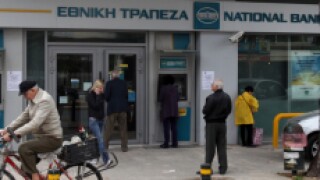Greece
-
Greece’s largest banks could only muster a collective 'no idea' when requested by the Hellenic Capital Markets Commission to inform the public on the estimated impact of capital controls.
-
The short term risk of Grexit might have receded, but nothing really looks solved. In nearly every currency union in history, once a sovereign joins a currency, it doesn't leave — except for the Pope.
-
Greece may be off most market participants’ radars for the moment. But with another election in the country looking increasingly likely, an already busy period for political risk could be about to grow worse.
-
A rare Greek IPO was announced on Tuesday, as Poseidon Containers, based in Athens, set out to raise about $230m by floating in New York, to finance purchases of container ships.
-
Chair of the European Central Bank’s supervisory board Danièle Nouy has revealed deferred tax assets (DTAs) are equivalent to nearly half of Greek banks’ own funds.
-
Lingering uncertainty over Greece put a curb on credit spread movement on Wednesday, as a Greek parliamentary vote on austerity reforms failed to materialise in time to affect the July index options expiry.
-
High yield borrowers continue to hold back deals and avoid paying steeper issue premiums than they would have faced before the latest Greek crisis, but the new bailout offer is easing fears.
-
Piraeus Bank has cancelled its covered bonds which, along with all other Greek covered bonds, are no longer eligible for funding under the European Central Bank’s Emergency Liquidity Assistance facility. The move comes after ECB raised ELA collateral haircuts to a rumoured 45% with a warning that it may cut liquidity off completely two weeks from now.
-
Markets could be facing a protracted period of uncertainty, as a Greek exit from the euro seems more likely after the “No” vote in Sunday’s Greek referendum. The Eurogroup is expected to hold a summit on Tuesday when it will become clear whether or not there is a political will to do a new deal with Greece. Risk aversion should ultimately favour covered bonds, but borrowers will need to price deals cautiously.
-
The Greek Prime Minister’s decision to provide voters with an opportunity to reject the country’s bailout conditions in a referendum is an unusual move, but not without precedent.
-
If Greece defaults on its debts it will be its sixth sovereign default since independence in 1829. In fact, Greece was in arrears on its external loans in no fewer than 51% of the subsequent 180 years, Europe’s worst record by far. But in those past defaults does there lie a solution for the country's troubles today?
-
Moody’s said on Thursday that, should Greece leave the euro, investors in Greek covered bonds would still likely receive payments in euros. Given that there are barely any Greek covered bonds held by third party investors, and the fact that the research is predicated on Grexit, the discussion is largely theoretical.




